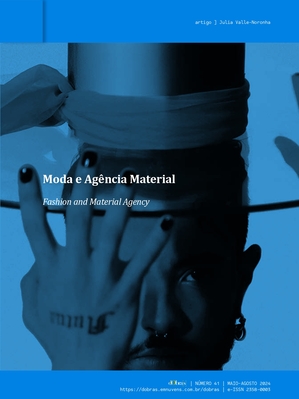Fashion and Material Agency
DOI:
https://doi.org/10.26563/dobras.i41.1834Keywords:
material agency, fashion practices, material experience, fashion and responsibilityAbstract
This article proposes to rethink fashion from a material agency perspective. It seeks to reimagine fashion practices based on the experiences we have with the things we wear. The text is based on theories of material agency, posthumanism and affects and becomings, and considers that not only people, but also the things we wear, play an active role in the fashion system. To discuss the subject fashion examples are used. The text concludes with reflections on what a turn to affect and material agency may mean to fashion design and experience.
Downloads
References
AHMED, Sara. The Cultural Politics of Emotion. Edinburgh: Edinburgh University Press, 2004.
ALMILA, Anna-Mari; INGLIS, David. What is ‘Fashion’ Really? The Promise of an Ecumenical Analytic for Fashion Studies and Beyond in a Globalized World. In: DELIC, Zlatan (Ed.). Epistemology and Transformation of Knowledge in Global Age. London: InTechOpen, 2017. DOI: https://doi.org/10.5772/intechopen.68614
APPADURAI, Arjun. The Social Life of Things. Commodities in cultural perspective. Cambridge: Cambridge University Press, 1986. DOI: https://doi.org/10.1017/CBO9780511819582
BARAD, Karen. Meeting the Universe Halfway: Quantum Physics and the Entanglement of Matter and Meaning. Durham and London: Duke University Press, 2007. DOI: https://doi.org/10.2307/j.ctv12101zq
BARRETT, Estelle; BOLT, Barbara. Carnal Knowledge. Towards a “New Materialism” through the Arts. London: I.B. Tauris, 2013. DOI: https://doi.org/10.5040/9780755603435
BARTHES, Roland. The Fashion System. [s.l.]: University of California Press, 1990.
BENNETT, Jane. Vibrant Matter A Political Ecology of Things. London: Duke University Press, 2010. DOI: https://doi.org/10.2307/j.ctv111jh6w
BENNETT, Tony; JOYCE, Patrick (org.). Material Powers: Cultural Studies, History and the Material Turn. London and New York: Routledge, 2010.
BLACKMAN, Lisa. Immaterial Bodies. Affect, Embodiment, Mediation. New Delhi: Sage, 2012. DOI: https://doi.org/10.4135/9781446288153
BRUGGEMAN, Daniëlle. More Than Meets the Eye. Dutch Fashion, Identity and New Materialism. 2014. PhD Thesis, Nijmegen: Radboud University Nijmegen, 2014.
BUCHANAN, Ian. The problem of the body in Deleuze and Guattari, or, what can a body do? Body and Society, v. 3, n. 3, p. 73-91, 1997. DOI: https://doi.org/10.1177/1357034X97003003004
COOLE, Diana; FROST, Samantha. New Materialisms. Ontology, Agency and Politics. Durham and London: Duke University Press, 2010. DOI: https://doi.org/10.2307/j.ctv11cw2wk
DELEUZE, Gilles; GUATTARI, Felix. A Thousand Plateaus. Capitalism and Schizophrenia. [s.l.]: University of Minnesota Press, 1987.
ENTWISTLE, Joanne. The Fashioned Body. Fashion, Dress and Modern Social Theory. Cambridge: Polity Press, 2000.
ESPINOZA, Benedict De. Ethics. London: Penguin Classics, 1994.
FINN, Angela. Object analysis: The dressmaker’s mark. Clothing Cultures, v. 1, n. 3, p. 321-324, 2014. DOI: https://doi.org/10.1386/cc.1.3.321_7
GIBSON, James J. The Ecological Approach to Visual Perception. London: Routledge, 2014. DOI: https://doi.org/10.4324/9781315740218
INGOLD, Tim. Making. London and New York: Routledge, 2013.
KAWAMURA, Y. Fashion-ology: An introduction to fashion studies. New York: Berg, 2005. DOI: https://doi.org/10.2752/9781847888730
MALAFOURIS, Lambros. How Things Shape the Mind: A theory of material engagement. Cambridge and London: MIT Press, 2013. DOI: https://doi.org/10.7551/mitpress/9476.001.0001
MILLER, Daniel. Stuff. Cambridge: Polity Press, 2009.
NEGRIN, Llewellyn. Maurice Mearleau-Ponty: The Corporeal Experience of Fashion. In: SMELIK, Agnès Rocamora and Anneke (org.). Thinking Through Fashion. London and New York: I.B. Tauris, p. 115-131, 2016. DOI: https://doi.org/10.5040/9780755694785.ch-007
NORMAN, Donald. The Psychology of Everyday Things. New York: Basic Books, 1988.
RUGGERONE, Lucia. The Feeling of Being Dressed: Affect Studies and the Clothed Body. Fashion Theory, v. 7419, , p. 1-22, September 2017.
SEELY, Stephen D. How Do You Dress a Body Without Organs? Affective Fashion and Nonhuman Becoming. Women’s Studies Quarterly, v. 41, n. 1 & 2, p. 247–266, 2013. DOI: https://doi.org/10.1353/wsq.2013.0069
SMELIK, Anneke. New materialism : A theoretical framework for fashion in the age of technological innovation. International Journal of Fashion Studies, v. 5, n. 1, p. 33-54, 2018. DOI: https://doi.org/10.1386/infs.5.1.33_1
SMELIK, Anneke; TOUSSAINT, Lianne; DONGEN, Pauline V. An. Solar Fashion: An embodied Approach to Wearable Technology. International Journal of Fashion Studies, v. 3, n. 2, p. 287-303, 2016. DOI: https://doi.org/10.1386/infs.3.2.287_1
STEELE, Valerie. A Museum of Fashion Is More Than a Clothes-Bag. Fashion Theory, v. 2, n. 4, p. 327-335, 1998. DOI: https://doi.org/10.2752/136270498779476109

Downloads
Published
How to Cite
Issue
Section
License
Copyright (c) 2024 Julia Valle Noronha

This work is licensed under a Creative Commons Attribution-NonCommercial-ShareAlike 4.0 International License.
The copyrights of the works published in this journal belong to the author, and dObra[s] holds the rights of first publication. Due to their publication in this open access journal, any work here is free to use, with its own attributions, in educational and non-commercial applications.









